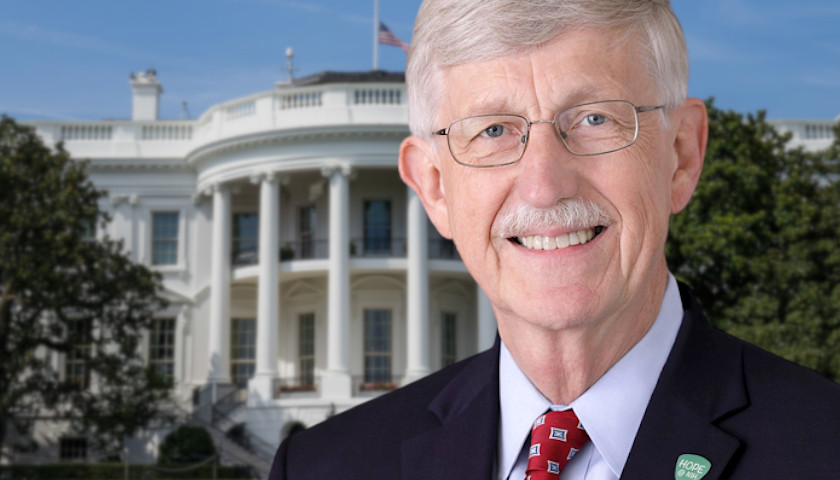President Joe Biden has tapped former National Institutes of Health (NIH) Director Dr. Francis Collins to serve as his top science advisor, several months after allegations that Collins and White House chief medical advisor Dr. Anthony Fauci were untruthful in their assertions that NIH did not fund gain-of-function research in Wuhan, China.
Biden announced Wednesday Collins will serve as Science Advisor to the President and co-chair of the President’s Council of Advisors on Science and Technology “until permanent leadership is nominated and confirmed.”
The announcement also noted that social scientist Dr. Alondra Nelson will serve as director of the White House Office of Science and Technology Policy (OSTP).
According to a report Thursday at Science, when she accepted Biden’s invitation to join OSTP in January 2021, Nelson referred to science as “a social activity” and stated that, “as a black woman researcher, I’m keenly aware of who has been missing from the room.”
The appointments are made in the wake of the resignation last week of Eric Lander after an internal review found “credible evidence” he had bullied members of his staff, Politico reported.
“These appointments will allow OSTP and the President’s Science and Technology agenda to move seamlessly forward under proven leadership,” the White House statement said.
As Science reported, however, Collins and Nelson will be dividing roles that have previously been held by one appointee, including Lander.
The report noted Biden plans to nominate a permanent replacement for Lander at some point in the future, with sources indicating neither Collins nor Nelson will be the nominee.
OSTP states one of its primary roles is to lead “efforts across the Federal government to develop and implement sound science and technology policies and budgets, and works with the private and philanthropic sectors, state, local, tribal, and territorial governments, the research and academic communities, and other nations toward this end.”
An OSTP spokesperson said, regarding the split roles, Collins will not report to Nelson or even have an office within OSTP, Science reported.
The decision to divide the roles, the report continued, has received mixed reviews by members of the research community in the United States.
Neal Lane, an emeritus physics professor at Rice University who also served as former President Bill Clinton’s science adviser while leading OSTP, said, according to the report, “I don’t understand it, and it doesn’t make any sense to me.”
Lane added OSTP’s main function is to advise the president on scientific issues. Dividing the roles, he said, is “an unprecedented experiment” that could backfire.
“Who’s in charge?” he asked. “If Francis isn’t reporting to Alondra, that raises serious questions.”
However, John Holdren, who served in both roles during the Obama era, dismissed the fuss over the split roles.
He views the dual arrangement as a solution to a problem created by Lander’s abrupt departure.
“Biden wanted someone of stature in biomedical research to lead the charge, and that is what Francis Collins represents,” Holdren said. “Lander was doing that, but those issues are not in Alondra Nelson’s wheelhouse.”
Collins, who served as NIH’s longest serving director, announced his retirement in October just weeks after Dr. Richard Ebright, professor of chemistry and chemical biology at Rutgers University, alleged Collins made false statements about grants from the National Institute of Allergy and Infectious Diseases (NIAID) – the agency Fauci oversees – to the Wuhan Institute of Virology.
The Intercept reported in September:
Documents obtained by The Intercept contain new evidence that the Wuhan Institute of Virology and the nearby Wuhan University Center for Animal Experiment, along with their collaborator, the U.S.-based nonprofit EcoHealth Alliance, have engaged in what the U.S. government defines as “gain-of-function research of concern,” intentionally making viruses more pathogenic or transmissible in order to study them, despite stipulations from a U.S. funding agency that the money not be used for that purpose.
After reviewing the documents, Ebright posted in a thread:
The materials confirm the grants supported the construction – in Wuhan – of novel chimeric SARS-related coronaviruses that combined a spike gene from one coronavirus with genetic information from another coronavirus, and confirmed the resulting viruses could infect human cells.
“The documents make it clear that assertions by the NIH director, Francis Collins, and the NIAID director, Anthony Fauci, that the NIH did not support gain-of-function research or potential pandemic pathogen enhancement at WIV are untruthful,” Ebright concluded.
“I told you so” doesn’t even begin to cover it here: https://t.co/9JFn85I24i
— Rand Paul (@RandPaul) October 21, 2021
In October, NIH corrected the assertions made by Collins and Fauci that the agency had not funded gain-of-function research in Wuhan, and acknowledged that Wuhan collaborator U.S.-based EcoHealth Alliance had violated certain terms and conditions of the grant.
“EcoHealth failed to report this finding right away, as was required by the terms of the grant,” a letter from NIH stated. “EcoHealth is being notified that they have five days from today to submit to NIH any and all unpublished data from the experiments and work conducted under this award.”
The letter continued, stating the coronavirus causing the COVID-19 infection was not connected to the EcoHealth research.
– – –
Susan Berry, PhD, is national education editor at The Star News Network. Email tips to [email protected].





